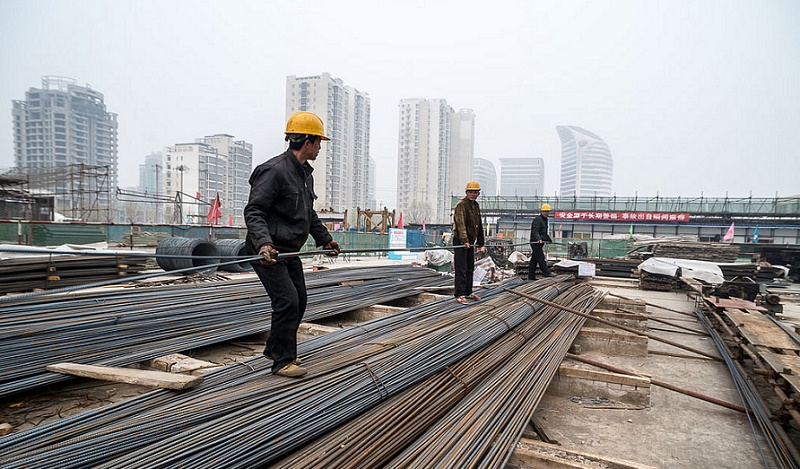Twenty-year-old Zhang Biao had been working as a general labourer at a construction site in the western city of Lanzhou for just ten days when he lost control of the steel cutter he was operating and severed the five toes on his right foot.
He had been hired by a local labour contractor and had not received any on-site job training. He did not have a formal employment contract or any insurance.
Zhang’s workmates carried him to a local hospital. The labour contractor gave him just five thousand yuan for medical expenses and promptly disappeared. “We called his mobile several times but it was an unregistered number,” said Zhang Biao’s brother, Zhang Kai, in an interview with China Labour Bulletin Director Han Dongfang.
When the brothers approached the main contractor, Gansu No. 1 Construction Engineering Group Co., Ltd, the company refused to apply for verification of work-related injury, as required by law, on the grounds that Zhang Biao had not signed a labour contract with the company and was therefore not an employee.
Han suggested that the brothers seek the help of the district and municipal trade union federations, pointing out that if a company refused to file for work accident verification, the trade union was obliged to step in and help the injured worker file their case. Moreover, Han said, China’s trade unions had recently been instructed by Party General Secretary Xi Jinping to do a better job in representing workers’ interests and therefore should be willing to help.
The Lanzhou municipal union, however, was not prepared to act and instead blamed the victim for his own misfortune. “Migrant workers don’t think it’s important to sign formal contracts with employers,” said a union official surnamed Zhang (no relation).
Eventually, the company approached the Zhang brothers and offered to cover Zhang Biao’s medical expenses, and provide compensation of around 10,000 yuan, equal to seven months’ salary calculated at the local minimum wage rate, which was far below Zhang’s actual salary.
The Zhang brothers went back to the union to help them get a better deal. The union said that because Zhang Biao had not paid union membership fees, they would not represent him. Moreover, union officials said the company’s offer was “good enough” and encouraged the brothers to accept the deal.
Undeterred, the brothers continued negotiations with the company on their own. News of the brothers’ case came to the attention of local government officials, and the company suddenly agreed to raise the compensation offer from 10,000 yuan to 80,000 yuan plus medical expenses, just about what Zhang was legally entitled to, based on the severity of his injury.
Zhang was discharged from hospital after the reattachment of four of his five severed toes. However, the doctors told him his situation remains uncertain and that there is still risk of gangrene, which would lead to amputation.
The Zhang brothers have until July next year, one year after the accident, to formally file for verification of workplace injury but it seems that unless the trade union suddenly sees the light, they will have to take this step by themselves.

Construction workers in Beijing. Photograph by Ding Zhou available at Flickr.com
Construction is one of the most dangerous and unregulated industries in China. Of the 520 serious incidents recorded on China Labour Bulletin’s Work Accident Map in 2016, 193 (37 percent) were in the construction industry, compared with just 45 incidents in coal mining and 59 in manufacturing.
The vast majority of construction workers are hired as casual labourers. They do not have formal employment contracts or insurance and are usually only paid on completion of the construction project, although wage arrears are a perennial problem: So much so that Ministry of Human Resources and Social Security has just issued a new regulation blacklisting any employer whose refusal to pay wages leads to a collective protest.
It is obvious that China’s roughly 50 million construction workers need the trade union to step up and ensure that they are paid what they are owed, have proper employment contracts, medical and work accident insurance, as well as a safe working environment.
However, the majority of local trade union officials are too passive, claiming they do not have the power to intervene or, as we saw in Zhang Biao’s case, blaming the workers for creating their own problems. Officials claim they can only help workers who are members of an enterprise union and that the multiple layers of sub-contracting in the construction sector makes it impossible to establish enterprise unions.
Given Xi Jinping’s call for China’s trade unions to do a better job in representing workers, there is clearly an opportunity now for local unions to make a renewed effort in the construction industry. Municipal union federations, for example, could approach the main contractor at each of the major construction projects within its jurisdiction with the aim of signing a collective agreement that protects every worker on the construction site regardless of whether they signed a formal work contract or not. Such an agreement would cover wages for each profession on site, health and safety, work hours and overtime, paid leave, layoffs, and grievance procedures, etc. just as similar agreements drawn up by construction industry trade unions in Europe and America do.
Such a move would not only provide much needed protection for construction workers it would also raise the profile of the trade union and show that it is actually on the side of the workers and can play a positive role in improving pay and working conditions.
